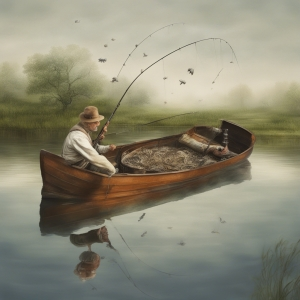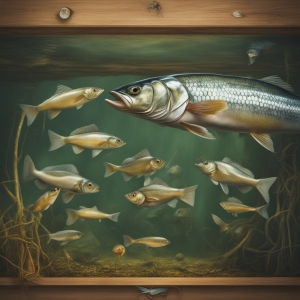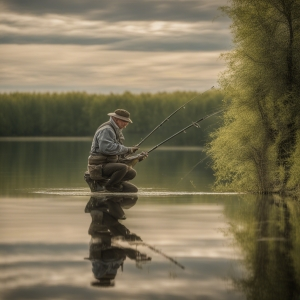Table of Contents:
Introduction: The Role of Luck in Fishing
Many believe that fishing is a game of luck. You grab your fishing gear, head out to your favorite waterside spot, cast your line and sit back to wait. However, is it really just blind luck that catches the fish or can strategy, knowledge, and skill tip the scales in your favor? In this article, we'll explore the role of luck in fishing and discuss how you can improve your odds through various methods. A great fishing trip isn't just about the destination - it's about the journey, the experience, and the knowledge gained along the way.
Whether you're a seasoned angler or a beginner in the fishing world, understanding the role that luck plays can enhance your fishing experience and increase your chances of a successful catch.
Understanding the Basics of Fishing
Fishing might seem straightforward, but there's more to it than just casting a line. The key to success lies in understanding the basic fundamentals. This includes knowledge about different types of fish, their habits, and the best times and places to find them. Effective baits, lures, and fishing gear also play an integral role. By mastering these basics, you are effectively enhancing your chances at landing a good catch and diminishing the role that sheer luck plays.
An important concept to grasp is that fish behaviors change according to seasons, water temperature, and even the time of day. They also feed on different prey at different times of the year. So adapting your bait and techniques in accordance with these factors can decidedly improve your odds.
For example, certain species of fish may be more active at dawn, dusk or during specific weather conditions. By understanding these behaviors, you stand a better chance at not just attracting fish, but catching them too.
The right equipment also contributes to your success. This doesn't mean you need to splurge on the most expensive gear. Rather, understanding which type of gear works best for the species you're targeting, can make a significant difference to your outcome.
Pros and Cons: Improving Your Odds in Fishing
| Pros | Cons |
|---|---|
| Better equipment can increase success | Fishing equipment can be expensive |
| Knowledge about fish behavior helps in prediction | Fish behavior can be unpredictable and influenced by many factors |
| Local knowledge of fishing spots increases chances | Some fishing spots might be overcrowded or overfished |
| Weather apps & technology can improve predictability | Weather can change quickly and without warning |
| Practicing casting and reeling can improve skill | Fishing requires patience and can be time-consuming |
Factors that can Increase Your Chances of Catching Fish

There are numerous variables which, if understood and implemented correctly, can significantly boost your odds when fishing. Let's explore a few of these:
The Right Fishing Spot: Not all parts of a lake, river, or ocean are teeming with fish. Some spots tend to be more popular among fish due to availability of food, shelter or ideal water conditions. Researching and selecting these "hot spots" can drastically improve your chances.
Patience and Observation: Fishing is not a fast-paced sport. It requires patience and a keen eye for observing water movement, shifts in weather, and changes in fish behavior. Be sure to take your time and stay alert to maximize your potential success.
Effective Fishing Techniques: Different types of fish can require different fishing techniques. Learning and employing these techniques can make the difference between an empty hook and a successful catch. Whether it is fly fishing, trolling, or deep sea fishing, using the correct technique can significantly improve your odds.
Local Knowledge: Talking to locals, guides, or other anglers can provide invaluable insights about the local fishing patterns. They can tell you about the best times, places, and baits to catch a certain species, based on their personal experiences and observations. This shared knowledge can be a treasure trove for increasing your odds at a fruitful fishing trip.
Choosing Your Bait and Tackle
Once you have the basics down, the next step is to select the right bait and tackle. This can greatly improve your chances of a successful catch. An understanding of what particular fish are attracted to can be crucial.
For instance, many fish are drawn towards live bait such as worms, minnows or insects. On the other hand, some types of fish may respond better to artificial lures. These are designed to imitate the colors, movement, and vibration of fish prey.
When it comes to choosing your tackle, opt for quality over quantity. A good fishing rod, in particular, is vital. Quality fishing rods have the right balance of strength, flexibility, and sensitivity, enabling you to cast accurately, maintain control, and detect even the gentlest bites.
Remember to pair your rod with a suitable fishing reel. The correct reel allows for efficient casting and retrieving, which can greatly influence your success. From spinning and baitcasting to fly and trolling reels, each one offers unique advantages, depending on your fishing style and target species.
Lastly, the fishing line is your direct connection to the fish and plays a critical role. The right line should be strong enough to withstand the weight of the fish but also subtle enough to not be detected.
In essence, choosing the right bait and tackle is not just about attracting fish, it's about having the proper tools to effectively reel them in.
Timing in Fishing: Weather and Fish Behavior

Getting the timing right is a great skill to master in fishing to increase your success rate. This includes understanding the impact of weather conditions, as well as the behaviors and patterns of different fish species.
Though fish are creatures of habit, a sudden change in weather can shift their patterns. For instance, fish tend to feed more before a storm. During this period, they can be found closer to the water's surface. So, timing your fishing trip around weather forecasts might give you an edge.
Furthermore, an angler who pays attention to the fish's feeding times will have a better chance of making a catch. Fish feeding times are strongly influenced by sunrise and sunset. During these times, the fish move to shallow waters to look for food, making them more accessible.
Understanding these behaviors isn't all down to luck. It’s a blend of experience, knowledge and attentive observation. The more you learn about the habits and preferences of the fish species you are targeting, the better chances you have to catch them.
So next time you head out for fishing, consider the weather and the time to make informed decisions. Incorporate this knowledge into your fishing strategy to optimize your success.
Scouting for the Right Spot
Finding the right fishing spot can feel like finding a needle in a haystack. However, with some patience and strategic thinking, you can increase your chances of discovering that perfect place. Understanding the fish's perspective is crucial here. They're attracted to areas that offer plentiful food, shelter and a suitable environment.
Start by researching different bodies of water. Look for areas where fish are likely to congregate. These may include underwater structures, such as fallen trees, patches of plants, or rocky ledges. Areas where fresh water merges with salt water - also known as estuaries - often attract a diverse array of fish species.
Don't underestimate the value of local knowledge and technology. Chat with local anglers or visit online fishing forums for valuable insights. Consider using tools such as depth finders, fish finders, or mapping software to aid your search. Remember, the process of finding that perfect spot is often a mixture of investigation, experimentation and of course, a little bit of luck.
Fishing Techniques to Improve Your Odds

The art of fishing involves a variety of techniques, each tailored to certain conditions and types of fish. Learning these methods can greatly boost your success on the water, as you'll be better equipped to attract and catch fish effectively.
Reading the Water: Understanding how to read the water can be a game-changer. Look for signs of fish activity, like jumping fish or swirling water. Also, be aware that fish like to hang out near structures like rocks, fallen trees, or grassy areas.
Master Casting: Improve your casting skills for better accuracy and distance. Practice casting in different directions and angles. You never know what kind of situation will present itself, so it's best to be prepared.
Working the Lures: Learn how to manipulate your lures to mimic the movement of the fish's natural prey. This requires a bit of practice, but it can significantly attract more bites.
Setting the Hook: A well-timed and firmly set hook ensures that the fish doesn't escape once it bites. Again, this takes practice, but mastering this technique can drastically improve your catch rate.
Weather-Pattern Fishing: Fish can be influenced by the weather. Learning how weather patterns impact fish behavior and adjusting your fishing strategies accordingly is key to success.
By understanding and mastering these techniques, you can greatly reduce the role luck plays in your fishing ventures, and rather rely on your skill and knowledge. Happy fishing!
Patience and Persistence: Beyond Luck in Fishing
Fishing is typically not a "quick reward" sport. Patience and the ability to endure are what set apart the occasional hobbyists from the consistent enthusiasts. While we can't control what happens beneath the water surface, we can control our reactions and how we handle the waiting game. Learning how to patiently work with the variables in fishing can tip the scales in your favor, reducing the dependence on mere luck.
Persistence in refining your fishing techniques, dedicating time to learn about different species of fish, and the determination to keep trying even when nothing seems to be biting are all part of increasing your odds. Not every fishing trip will be successful, but if you stay persistent, stay patient, and consistently work on improving your fishing skills, it is more likely that you'll make a big catch.
Remember, progressing your fishing skills isn't a race, it's a journey. Each trip to the water's edge is an opportunity to learn, improve and eventually, increase your catch rate. Luck may always play a role, but with patience, persistence, and practice, you can ensure that it plays just a minor one.
Conclusion: Boosting Your Fishing Luck
In conclusion, while luck does play a small part in fishing, your odds can be significantly improved through knowledge, preparation, and technique. From the right fishing spot and effective fishing techniques, to patience, observation and the right gear, these factors all combine to give you an edge when trying to land that prized catch.
While the unpredictability of fishing is part of its charm, knowing that you can impact your success through your own actions can make the experience even more rewarding. Instead of leaving things to chance, you can become an active participant in your fishing fate. So, embark on your fishing journey not with fingers crossed in hope, but armed with knowledge, skill and anticipation of a fruitful catch!
Mastering The Art of Fishing: Improving Your Odds
What role does luck play in fishing?
Luck can occasionally play a role in fishing. However, consistent success in fishing is usually a result of practice, knowledge, and the right equipment.
Can I improve my odds of catching fish?
Absolutely. Investing time in learning about the species you're targeting, their habits, and preferred bait can enhance your odds significantly. The right equipment and patience also play crucial roles.
How significant is the role of the bait in fishing?
Choosing the right bait for your target species is essential. Different species are attracted to different types of bait, so knowledge and preparation really matter.
Does time of day affect my luck in fishing?
Yes, certain fish are more active at certain times of the day. Understanding these patterns can improve your results.
Can the location have an effect on my fishing success?
Definitely. Know the water body where you're fishing. Different species inhabit different water types, from rivers to deep sea. Finding the right spot within these locations can also be key.







